Issue: 0109 June 2009
Message from the Chair
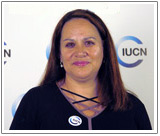 During the final 1992 Preparatory Committee meeting of the UN Conference on Environment Development (UNCED), negotiations for The Forest Principles stalled, over amongst other things, a reluctance by some States to accept any text that suggested that trees and forests were living. The refusal to acknowledge the integrity of life spilled over into the Earth Charter negotiations as a similar resistance to accept any text using the term ‘mother earth' or earth as a living being or system resulted in changing the once poetic peoples' Rio Earth Charter into the ‘UN-speak' Rio Declaration. For many, this was an omen that despite the intention of UNCED for governments to pledge to a future based on sustainable development, the power/wealth sectors of the international and global community were not yet ready to commit to the ethical and equity shifts that sustainability requires. During the final 1992 Preparatory Committee meeting of the UN Conference on Environment Development (UNCED), negotiations for The Forest Principles stalled, over amongst other things, a reluctance by some States to accept any text that suggested that trees and forests were living. The refusal to acknowledge the integrity of life spilled over into the Earth Charter negotiations as a similar resistance to accept any text using the term ‘mother earth' or earth as a living being or system resulted in changing the once poetic peoples' Rio Earth Charter into the ‘UN-speak' Rio Declaration. For many, this was an omen that despite the intention of UNCED for governments to pledge to a future based on sustainable development, the power/wealth sectors of the international and global community were not yet ready to commit to the ethical and equity shifts that sustainability requires.
Read more >>>
 From the Deputy Chair From the Deputy Chair
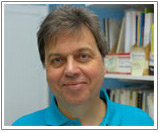 Warm greetings to you all! - When Aroha kindly invited me to be the Deputy Chair of CEESP I wondered how best I could help facilitate the work of the members of this remarkable Commission. The answers I came up with are really a commitment to all of you. As Deputy Chair, I shall do my best to ensure that CEESP offers... Warm greetings to you all! - When Aroha kindly invited me to be the Deputy Chair of CEESP I wondered how best I could help facilitate the work of the members of this remarkable Commission. The answers I came up with are really a commitment to all of you. As Deputy Chair, I shall do my best to ensure that CEESP offers...
Read more >>>
 Executive Officer Executive Officer
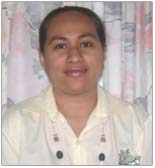 Elizabeth Erasito is from Rotuma, an island in the far north of Fiji. Rotuma has been politically a part of Fiji since 1881 and are a minority group in Fiji. Their culture closely resembles that of Polynesians. She is currently the Director for the National Trust of Fiji whose core function is cultural and natural heritage protection and the projects managed under her include community... Elizabeth Erasito is from Rotuma, an island in the far north of Fiji. Rotuma has been politically a part of Fiji since 1881 and are a minority group in Fiji. Their culture closely resembles that of Polynesians. She is currently the Director for the National Trust of Fiji whose core function is cultural and natural heritage protection and the projects managed under her include community...
Read more >>>
 Back to top Back to top
|
|
INTRODUCING THE THEME CO-CHAIRS
Culture and Conservation (TCC) 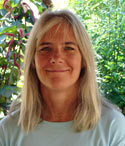 Elise Huffer, (France and USA). Elise Huffer is the Culture Adviser in the Human Development Programme of the Secretariat of the Pacific Community based in Noumea, New Caledonia. In this position she is responsible for the promotion of culture in the Pacific Islands region. This entails implementation of model laws for the protection of traditional knowledge, the promotion of measures to assist the development of the arts and crafts sector (including the protection and promotion of natural resources the arts and crafts sectors depend on) and the promotion of cultural epistemology. The SPC covers 22 Pacific Islands Countries and Territories and works closely with member countries, the civil society sector and other governmental and non-governmental regional and... Read more >>> Elise Huffer, (France and USA). Elise Huffer is the Culture Adviser in the Human Development Programme of the Secretariat of the Pacific Community based in Noumea, New Caledonia. In this position she is responsible for the promotion of culture in the Pacific Islands region. This entails implementation of model laws for the protection of traditional knowledge, the promotion of measures to assist the development of the arts and crafts sector (including the protection and promotion of natural resources the arts and crafts sectors depend on) and the promotion of cultural epistemology. The SPC covers 22 Pacific Islands Countries and Territories and works closely with member countries, the civil society sector and other governmental and non-governmental regional and... Read more >>>
 Kenneth Iain MacDonald, (Canada). Kenneth MacDonald teaches in the Department of Geography; the Program in International Development Studies; and the Program in Diaspora and Transnational Studies at the University of Toronto, in Toronto, Ontario, Canada. He has conducted field research, primarily in northern Pakistan and India, since 1986 in areas as diverse as glacial hydrology, agro-ecology, cultural analyses of risk, the politics of labour relations in the mountaineering industry, the cultural politics of conservation, and the production of cultural identity. These projects are held together by a desire to understand how communities and environments function in a world in which the lives of individuals are tied together through spatially extensive relations... Read more >>> Kenneth Iain MacDonald, (Canada). Kenneth MacDonald teaches in the Department of Geography; the Program in International Development Studies; and the Program in Diaspora and Transnational Studies at the University of Toronto, in Toronto, Ontario, Canada. He has conducted field research, primarily in northern Pakistan and India, since 1986 in areas as diverse as glacial hydrology, agro-ecology, cultural analyses of risk, the politics of labour relations in the mountaineering industry, the cultural politics of conservation, and the production of cultural identity. These projects are held together by a desire to understand how communities and environments function in a world in which the lives of individuals are tied together through spatially extensive relations... Read more >>>
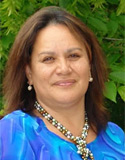 Aroha Te Pareake Mead, (New Zealand). Aroha Te Pareake Mead is from the Ngati Awa and Ngati Porou tribes (Maori) of Aotearoa, New Zealand. She has served two terms on the IUCN Council, 2000-2008 and one term as Co-Chair of the Theme on Culture & Conservation. She has been involved in indigenous cultural and intellectual property and environmental issues for over 30 years at tribal, national, Pacific regional and international levels. Currently a Senior Lecturer in Maori Business, Treaty of Waitangi, Maori Resource Management and Indigenous Cultural & Intellectual Property issues at Victoria University of Wellington's School of Management and Senior Visiting Research Fellow at the Centre for Environmental Law, Macquarie University in Sydney, Australia... Read more >>> Aroha Te Pareake Mead, (New Zealand). Aroha Te Pareake Mead is from the Ngati Awa and Ngati Porou tribes (Maori) of Aotearoa, New Zealand. She has served two terms on the IUCN Council, 2000-2008 and one term as Co-Chair of the Theme on Culture & Conservation. She has been involved in indigenous cultural and intellectual property and environmental issues for over 30 years at tribal, national, Pacific regional and international levels. Currently a Senior Lecturer in Maori Business, Treaty of Waitangi, Maori Resource Management and Indigenous Cultural & Intellectual Property issues at Victoria University of Wellington's School of Management and Senior Visiting Research Fellow at the Centre for Environmental Law, Macquarie University in Sydney, Australia... Read more >>>

Environment, Macroeconomics, Trade & Investment (TEMTI)
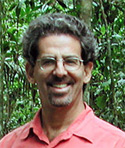 Peter Herman May, (Brazil and USA). Peter May is President of the International Society for Ecological Economics. He received his PhD in Resource Economics from Cornell University in 1986. Professor of the Department of Development, Agriculture and Society of the Federal Rural University of Rio de Janeiro, Brazil since 1991, he is now also an Associate Director of Friends of the Earth-Brazilian Amazon. Author and editor of 12 books in the areas of ecological economics, agro ecology and environmental policy, including The Subsidy from Nature , Pricing the Planet and Natural Resource Valuation and Policy in Brazil (all published by Columbia UP), He previously served as program officer at the Ford Foundation's Brazil office and as Forestry Officer... Read more >>> Peter Herman May, (Brazil and USA). Peter May is President of the International Society for Ecological Economics. He received his PhD in Resource Economics from Cornell University in 1986. Professor of the Department of Development, Agriculture and Society of the Federal Rural University of Rio de Janeiro, Brazil since 1991, he is now also an Associate Director of Friends of the Earth-Brazilian Amazon. Author and editor of 12 books in the areas of ecological economics, agro ecology and environmental policy, including The Subsidy from Nature , Pricing the Planet and Natural Resource Valuation and Policy in Brazil (all published by Columbia UP), He previously served as program officer at the Ford Foundation's Brazil office and as Forestry Officer... Read more >>>
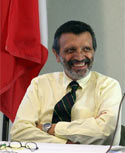 Alejandro Nadal, (Mexico). Alejandro Nadal is a professor at El Colegio de México, where he directs the research Program on Science, Technology and Development (1982-2007). He has a B.A. in Law from the National Autonomous University and a Ph.D. in Economics from the University of Paris X (Nanterre). He has carried out research on macroeconomics, general equilibrium theory, technical change, nuclear weapons and sustainable resource management. He was responsible for the course on Comparative Economic Theory in the MA and PhD programs at the Center for Economic Studies, El Colegio de México (1982-2006). He was chair of the Collaborative Research Competition of the John D. and Caherine T. MacArthur Foundation (1991-1992), where he was also Distinguished... Read more >>> Alejandro Nadal, (Mexico). Alejandro Nadal is a professor at El Colegio de México, where he directs the research Program on Science, Technology and Development (1982-2007). He has a B.A. in Law from the National Autonomous University and a Ph.D. in Economics from the University of Paris X (Nanterre). He has carried out research on macroeconomics, general equilibrium theory, technical change, nuclear weapons and sustainable resource management. He was responsible for the course on Comparative Economic Theory in the MA and PhD programs at the Center for Economic Studies, El Colegio de México (1982-2006). He was chair of the Collaborative Research Competition of the John D. and Caherine T. MacArthur Foundation (1991-1992), where he was also Distinguished... Read more >>>
 Pavan Sukhdev, (India). Pavan Sukhdev is the Project Leader for UNEP's “Green Economy” initiative, a major UNEP project suite to demonstrate that the greening of economies is not a burden on growth but rather a new engine for growth, employment, and the reduction of persistent poverty. Pavan is also Study Leader for the G8+5 commissioned report on The Economics of Ecosystems and Biodiversity (“TEEB”), a project he was appointed to lead in March 2008 by the EU Commission and Germany whilst still working full time at Deutsche Bank. TEEB's Interim Report was welcomed globally for its fresh economic outlook, showing the economic significance of the loss of nature's services, and connecting... Read more >>> Pavan Sukhdev, (India). Pavan Sukhdev is the Project Leader for UNEP's “Green Economy” initiative, a major UNEP project suite to demonstrate that the greening of economies is not a burden on growth but rather a new engine for growth, employment, and the reduction of persistent poverty. Pavan is also Study Leader for the G8+5 commissioned report on The Economics of Ecosystems and Biodiversity (“TEEB”), a project he was appointed to lead in March 2008 by the EU Commission and Germany whilst still working full time at Deutsche Bank. TEEB's Interim Report was welcomed globally for its fresh economic outlook, showing the economic significance of the loss of nature's services, and connecting... Read more >>>

Environment and Security (TES)
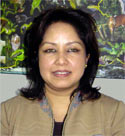 Arzu Rana Deuba, (Nepal). Arzu Deuba is an M.P. in Nepal. She is Chair of the CEESP Theme on Environment & Security and is also a member of CEC. She graduated from St. Bedes College, Himalchal Pradesh University and Punjab University from where she not only got her Master's degree but also her Ph.D in organizational Psychology in 1990. The time after her graduation was a period of both realization and decision making for Deuba. It was in the late 1980s and the early 1990s that the importance of issues related to environment came to forefront in Nepal due to a number of developments that occurred during that period. The primary factor that gave momentum to the issue of... Read more >>> Arzu Rana Deuba, (Nepal). Arzu Deuba is an M.P. in Nepal. She is Chair of the CEESP Theme on Environment & Security and is also a member of CEC. She graduated from St. Bedes College, Himalchal Pradesh University and Punjab University from where she not only got her Master's degree but also her Ph.D in organizational Psychology in 1990. The time after her graduation was a period of both realization and decision making for Deuba. It was in the late 1980s and the early 1990s that the importance of issues related to environment came to forefront in Nepal due to a number of developments that occurred during that period. The primary factor that gave momentum to the issue of... Read more >>>

Governance of Natural Resources, Equity & Rights (TGER)
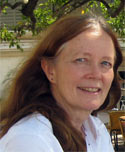 Janis Bristol Alcorn, (USA). Janis Alcorn has over thirty years experience in conservation of biodiversity, international development, and research in tropical ecology and indigenous natural resource management systems, in Asia, Africa and the Americas. She received her Ph.D. in Botany, with a minor in Anthropology, from the University of Texas at Austin in 1982. She served on the faculty at Tulane University, as an American Association for the Advancement of Science (AAAS) Fellow in USAID, Fellow in the Governance program at World Resources Institute, and as Director for Asia & Pacific and the global Peoples, Forests and Reefs Program at the Biodiversity Support Program at WWF. She is currently an independent consultant... Read more >>> Janis Bristol Alcorn, (USA). Janis Alcorn has over thirty years experience in conservation of biodiversity, international development, and research in tropical ecology and indigenous natural resource management systems, in Asia, Africa and the Americas. She received her Ph.D. in Botany, with a minor in Anthropology, from the University of Texas at Austin in 1982. She served on the faculty at Tulane University, as an American Association for the Advancement of Science (AAAS) Fellow in USAID, Fellow in the Governance program at World Resources Institute, and as Director for Asia & Pacific and the global Peoples, Forests and Reefs Program at the Biodiversity Support Program at WWF. She is currently an independent consultant... Read more >>>
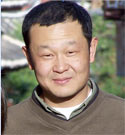 Li Bo, (China). Li Bo is a member of the Bai ethnic group from North Western Yunnan (China) [the Bai are an indigenous minority of four million people]. President of Friends of Nature in Beijing – the largest Chinese domestic environment NGO. Li Bo holds a Master of Science Degree on Natural Resources Management from Cornell University and since 1994 has been working with non-governmental initiatives in South West China as farmers' rights activist, project officer, trainer, researcher and consultant on issues of livelihoods of mountain communities and biodiversity conservation. Throughout these twelve years, he developed an enduring passion... Read more >>> Li Bo, (China). Li Bo is a member of the Bai ethnic group from North Western Yunnan (China) [the Bai are an indigenous minority of four million people]. President of Friends of Nature in Beijing – the largest Chinese domestic environment NGO. Li Bo holds a Master of Science Degree on Natural Resources Management from Cornell University and since 1994 has been working with non-governmental initiatives in South West China as farmers' rights activist, project officer, trainer, researcher and consultant on issues of livelihoods of mountain communities and biodiversity conservation. Throughout these twelve years, he developed an enduring passion... Read more >>>

Indigenous & Local Communities, Equity & Livelihood Rights in Protected Areas (TILCEPA)
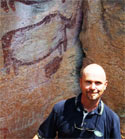 Nigel Crawhall, (South Africa). Nigel Crawhall holds a PhD in Sociolinguistics from the University of Cape Town. He is currently the Director of Secretariat for the Indigenous Peoples of Africa Coordinating Committee (IPACC) based in Cape Town, South Africa. He is an occasional consultant to UNESCO's Culture Section, Division for Cultural Policies and Intercultural Dialogue. He is formerly the Cultural Programme Manager of the South African San Institute and the Director of the South African National Language Project. Nigel is cooperating with the Technical Centre for Agricultural and Rural Cooperation on developing participatory mapping related training materials. Read more >>> Nigel Crawhall, (South Africa). Nigel Crawhall holds a PhD in Sociolinguistics from the University of Cape Town. He is currently the Director of Secretariat for the Indigenous Peoples of Africa Coordinating Committee (IPACC) based in Cape Town, South Africa. He is an occasional consultant to UNESCO's Culture Section, Division for Cultural Policies and Intercultural Dialogue. He is formerly the Cultural Programme Manager of the South African San Institute and the Director of the South African National Language Project. Nigel is cooperating with the Technical Centre for Agricultural and Rural Cooperation on developing participatory mapping related training materials. Read more >>>
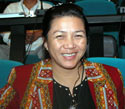 Jannie Lasimbang, (Malaysia). Jannie Lasimbang is Kadazan, one of 39 indigenous groups in Sabah, Malaysia. She is currently the Coordinator, Indigenous Knowledge and Biodiversity Programme at the Asia Indigenous Peoples Pact (AIPP) and an Expert/Member on the UN Expert Mechanism on the Rights of Indigenous Peoples,of the UN Human Rights Council. Formerly she was the Secretary General of the Asia Indigenous Peoples Pact (AIPP) Foundation based in Thailand. Jannie has been actively engaged in discussions of indigenous perspectives on... Read more >>> Jannie Lasimbang, (Malaysia). Jannie Lasimbang is Kadazan, one of 39 indigenous groups in Sabah, Malaysia. She is currently the Coordinator, Indigenous Knowledge and Biodiversity Programme at the Asia Indigenous Peoples Pact (AIPP) and an Expert/Member on the UN Expert Mechanism on the Rights of Indigenous Peoples,of the UN Human Rights Council. Formerly she was the Secretary General of the Asia Indigenous Peoples Pact (AIPP) Foundation based in Thailand. Jannie has been actively engaged in discussions of indigenous perspectives on... Read more >>>

Social & Environmental Accountability of the Private Sector (SEAPRISE)
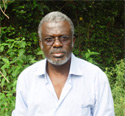 Emmanuel Asuquo Obot, (Nigeria). Emmanuel Obot is the Executive Director of the Nigerian Conservation Foundation. He has a PhD (Botany) and his main areas of work and experience are as follows: Biodiversity Conservation, Biodiversity Related Research, Project management, Sustainable Development, Forest Resources Policy, Forest Resources Management, Training in Natural Resources Management, Natural Resources Policy Advocacy, Community Based Conservation Management, Wetland Resources Management. He has worked, for twenty-eight years, on the design and implementation ... Read more >>> Emmanuel Asuquo Obot, (Nigeria). Emmanuel Obot is the Executive Director of the Nigerian Conservation Foundation. He has a PhD (Botany) and his main areas of work and experience are as follows: Biodiversity Conservation, Biodiversity Related Research, Project management, Sustainable Development, Forest Resources Policy, Forest Resources Management, Training in Natural Resources Management, Natural Resources Policy Advocacy, Community Based Conservation Management, Wetland Resources Management. He has worked, for twenty-eight years, on the design and implementation ... Read more >>>
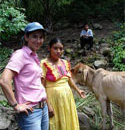 María Pacheco, (Guatemala). Maria Pacheco is a biologist and an organic farmer. In 1993, María was approached by a group of villagers from a war-torn village who wanted her help in finding a way out of poverty. Ten farmers started the project, and with María's guidance and assistance, worked on reforestation and helped the land recover, eventually developing products such as wooden educational toys for sale, developing markets, and finding financial assistance. Then, in 2001, María was asked to help another group of villages in Jocotán near the border with Honduras, a community of Chortí Maya. (In prehispanic times, the Chortí Maya were the weavers of the rugs, the mats on which the kings sat ... Read more >>> María Pacheco, (Guatemala). Maria Pacheco is a biologist and an organic farmer. In 1993, María was approached by a group of villagers from a war-torn village who wanted her help in finding a way out of poverty. Ten farmers started the project, and with María's guidance and assistance, worked on reforestation and helped the land recover, eventually developing products such as wooden educational toys for sale, developing markets, and finding financial assistance. Then, in 2001, María was asked to help another group of villages in Jocotán near the border with Honduras, a community of Chortí Maya. (In prehispanic times, the Chortí Maya were the weavers of the rugs, the mats on which the kings sat ... Read more >>>
 Clive Montgomery Wicks, (United Kingdom). Conservation and Development Consultant, Specialising in the Impact of Extractive Industries on the Environment. He is a Fellow of the Chartered Institute of Management UK. He has 48 years of experience of working in engineering, agriculture and on environmental issues. He is Vice Chair of CEESP the IUCN Commission on Environmental, Economic and Social Policy and Co-Chair of SEAPRISE the... Read more >>> Clive Montgomery Wicks, (United Kingdom). Conservation and Development Consultant, Specialising in the Impact of Extractive Industries on the Environment. He is a Fellow of the Chartered Institute of Management UK. He has 48 years of experience of working in engineering, agriculture and on environmental issues. He is Vice Chair of CEESP the IUCN Commission on Environmental, Economic and Social Policy and Co-Chair of SEAPRISE the... Read more >>>

Sustainable Livelihoods (TSL)
 Taghi Farvar, (Iran). Taghi Farvar is the former Chair of CEESP (2000-2008). He has over 35 years of international professional experience in Africa, Asia, Latin America/Caribbean as well as Europe and North America as field worker, researcher, trainer, advisor, planner, manager, organiser and policy-maker for programmes and projects in integrated, sustainable and participatory management of natural resources; promotion of sustainable livelihoods and poverty alleviation; conflict resolution on natural resources... Read more >>> Taghi Farvar, (Iran). Taghi Farvar is the former Chair of CEESP (2000-2008). He has over 35 years of international professional experience in Africa, Asia, Latin America/Caribbean as well as Europe and North America as field worker, researcher, trainer, advisor, planner, manager, organiser and policy-maker for programmes and projects in integrated, sustainable and participatory management of natural resources; promotion of sustainable livelihoods and poverty alleviation; conflict resolution on natural resources... Read more >>>
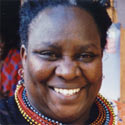 Lucy Mulenkei, (Kenya). Lucy Mulenkei is a Maasai from Kenya who has began as a broadcast journalist in the government-run radio for 17 years on issues of the environment and development. Her programming focused on environment problems in rural Kenya and the East African Region. Lucy also runs the Indigenous Information Network (IIN) in Kenya, which publishes the popular grassroots publication, Nomadic News, focusing on environmental issues and successes affecting pastoralists and hunter-gatherers in Africa. IIN also disseminates environmental information related to the indigenous movement worldwide, and organizes... Read more >>> Lucy Mulenkei, (Kenya). Lucy Mulenkei is a Maasai from Kenya who has began as a broadcast journalist in the government-run radio for 17 years on issues of the environment and development. Her programming focused on environment problems in rural Kenya and the East African Region. Lucy also runs the Indigenous Information Network (IIN) in Kenya, which publishes the popular grassroots publication, Nomadic News, focusing on environmental issues and successes affecting pastoralists and hunter-gatherers in Africa. IIN also disseminates environmental information related to the indigenous movement worldwide, and organizes... Read more >>>
 Michel Pimbert, (France and UK). Dr. Michel Pimbert is currently Director of the Sustainable Agriculture, Biodiversity and Livelihoods Program at the UK based International Institute for Environment and Development (IIED www.iied.org). An agricultural ecologist by training, he previously worked at the International Crops Research Institute for the Semi Arid Tropics (ICRISAT) in India, the University François Rabelais de Tours in France, and the World Wide Fund for Nature in Switzerland. Dr. Pimbert has been a Board member of several international NGOs working on food sovereignty, sustainable agriculture and... Read more >>> Michel Pimbert, (France and UK). Dr. Michel Pimbert is currently Director of the Sustainable Agriculture, Biodiversity and Livelihoods Program at the UK based International Institute for Environment and Development (IIED www.iied.org). An agricultural ecologist by training, he previously worked at the International Crops Research Institute for the Semi Arid Tropics (ICRISAT) in India, the University François Rabelais de Tours in France, and the World Wide Fund for Nature in Switzerland. Dr. Pimbert has been a Board member of several international NGOs working on food sovereignty, sustainable agriculture and... Read more >>>

|
|
|
THE STEERING COMMITTEE
The Steering Committee of CEESP are appointed according to the Statutes and assist the Chair in guiding and coordinating the activities of the Commission. Members comprise The Chair, Deputy Chair, Financial Officer, Thematic Chairs, Regional Vice Chairs and any other Advisors and experts proposed by the Chair or the Steering Committee through the Chair and approved by Council. Currently as well as the Thematic Chairs, Council also approved the appointment of three experts to the CEESP SC.
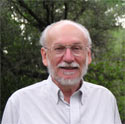 Financial Officer: Richard Cellarius, (USA). Dr. Cellarius has a great deal of experience in environmental sciences, education, and policy. A major focus of his professional and volunteer efforts has been the application of environmental knowledge and understanding to environmental decision making. He has an undergraduate degree in Physics and a Ph.D. in Biological Sciences. He has 43 years of college and university teaching experience, and research experience in the natural sciences and environmental studies, including teaching and supervision of graduate students in ecology, ecological physiology, alternative ... Read more >>> Financial Officer: Richard Cellarius, (USA). Dr. Cellarius has a great deal of experience in environmental sciences, education, and policy. A major focus of his professional and volunteer efforts has been the application of environmental knowledge and understanding to environmental decision making. He has an undergraduate degree in Physics and a Ph.D. in Biological Sciences. He has 43 years of college and university teaching experience, and research experience in the natural sciences and environmental studies, including teaching and supervision of graduate students in ecology, ecological physiology, alternative ... Read more >>>
 Advisor, Cross Commission Collaboration: Donna Craig (Australia). Donna Craig is an academic and specialist practitioner in the area of international and national environmental law and policy. She obtained a Masters degree in Environmental Law from Osgoode Hall Law School , York University, Canada in 1983. Donna has over 30 years experience in research, legal practice, teaching and working with communities, indigenous peoples' organisations, governments and corporations. Her many publications emphasize the social, cultural and human rights dimensions of environmental and social impact assessment and sustainable development. In private practice, Donna has developed corporate environmental management strategies, compliance training and environmental... Read More >>> Advisor, Cross Commission Collaboration: Donna Craig (Australia). Donna Craig is an academic and specialist practitioner in the area of international and national environmental law and policy. She obtained a Masters degree in Environmental Law from Osgoode Hall Law School , York University, Canada in 1983. Donna has over 30 years experience in research, legal practice, teaching and working with communities, indigenous peoples' organisations, governments and corporations. Her many publications emphasize the social, cultural and human rights dimensions of environmental and social impact assessment and sustainable development. In private practice, Donna has developed corporate environmental management strategies, compliance training and environmental... Read More >>>
 Advisor, Grazia Borrini-Feyerabend (Switzerland). Grazia Borrini-Feyerabend has been active in solar physics, public health, aid policy and community initiatives for conservation and sustainable development. After a research career in physics as European Space Agency Fellow (University of Florence, Italy; Stanford University, California) she pursued studies and became engaged as researcher and teacher in public health and development subjects (University of California at Berkeley, California; National Institute of Health, Italy). In the mid 1990s she pioneered the Primary Environmental Care approach, which later became... Read More >>> Advisor, Grazia Borrini-Feyerabend (Switzerland). Grazia Borrini-Feyerabend has been active in solar physics, public health, aid policy and community initiatives for conservation and sustainable development. After a research career in physics as European Space Agency Fellow (University of Florence, Italy; Stanford University, California) she pursued studies and became engaged as researcher and teacher in public health and development subjects (University of California at Berkeley, California; National Institute of Health, Italy). In the mid 1990s she pioneered the Primary Environmental Care approach, which later became... Read More >>>
We are still in the process of identifying Regional Vice-Chairs so please contact the Chair (aroha.mead@vuw.ac.nz) if you are interested in representing your Region on the CEESP SC.

|
|
|
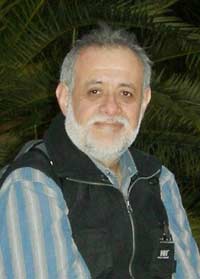
|
Message from Secretariat Focal Point
Gonzalo Oviedo, IUCN's Senior Adviser on Social Policy and IUCN's Secretariat Focal Point for CEESP
I work as Senior Adviser on Social Policy at IUCN Headquarters in Gland, Switzerland, since 2003. One of my duties is to serve as the global focal point of the IUCN Secretariat for CEESP, providing technical and operational support for its work and facilitating the links between the IUCN Secretariat and the various thematic and regional groups of the Commission.
I was born in Ecuador, South America. Since my childhood, I shared a considerable part of my life with indigenous and rural people, and experienced firsthand the challenges that they faced in a world of poverty, insecurity and political oppression. My interest in social issues and their immediate connection with nature and ecosystems led me to train in Social Anthropology and later in Environmental management. I started my career in indigenous and community education in my home country, and since then I have been involved in a broad range of social aspects of nature conservation, with a strong focus on indigenous peoples issues, livelihood security and topics of rights and governance. Read more >>>
 Back to top Back to top
|
 |


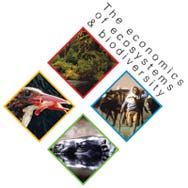

|
NEWS
June 5th - World Environment Day - Celebrate with the Earth Charter - We are living in challenging times. As members of the community of life on Earth, we have jeopardized our own existence and the right to life of many other living beings through extensive environmental alteration. Our individual and shared responsibility to protect the planet is highlighted by the climate change crisis, which is one of the most obvious and pressing challenges to all life on Earth... Read more >>>
 Follow-Up for CEESP related WCC Resolutions - Ken MacDonald and Rick Steiner have undertaken an initiative to record the work that CEESP members are contributing towards the implementation of CEESP-related resolutions approved during the 2008 WCC. Follow-Up for CEESP related WCC Resolutions - Ken MacDonald and Rick Steiner have undertaken an initiative to record the work that CEESP members are contributing towards the implementation of CEESP-related resolutions approved during the 2008 WCC.
This effort builds on a clear call from members for better information on the fate of resolutions approved during... Read more >>>

Resolution 4.039: Cross-commission collaboration on sustainable use of biological resources.
At the IUCNWCC in Barcelona Members passed Resolution 4.039: Cross-commission collaboration on sustainable use of biological resources. This resolution calls on the IUCN Commissions, especially SSC and CEESP, to establish a mechanism for increased cooperation on the benefits of sustainable use of renewable natural ... Read more >>>

The Economics of Ecosystems and Biodiversity (TEEB) - The TEEB study was launched by Germany and the European Commission in response to a proposal by the G8+5 Environment Ministers, at their 2007 meeting in Potsdam, Germany, to develop a global study on the economics of biodiversity loss. TEEB is led by Pavan Sukhdev, chairman of Deutsche Bank's “Global Markets Centre” in Mumbai, a Founder-Director of the ‘Green Accounting for Indian States Project” ... Read more >>>

Economics @ IUCN - Update from the Secretariat Chief Economist, Joshua Bishop - The 4th World Conservation Congress held in Barcelona, Spain, in October 2008 identified economic issues as the highest priority for IUCN, reflected in the adoption by Members of a new Global Programme that includes “Greening the World Economy” as one of five priority thematic areas over the period 2009-12. To meet this challenge, the Secretariat has reinforced its capacity in economics... Read more >>>

Joint TGER-TILCEPA Task Force on REDD and Communities Established - Policies and strategies to Reduce Emissions from Deforestation and forest Degradation in Developing countries (REDD) are one of the most controversial issues on the agenda of the current climate negotiations, which are to lead to a global climate agreement in December 2009 in Copenhagen. While a socially and environmentally sound, rights-based REDD agreement might provide significant opportunities for the... Read more >>>

New CEESP Agrofuels Network - An “Agrofuels Network” has been created in SEAPRISE to share solutions to the detrimental socio-cultural-environmental impacts caused by increased prioritisation of industrial agriculture, i.e., large-scale monocultures producing fuels from crops like corn, sugarcane, soy and even trees. Many of these projects are damaging the livelihood of local farmers as well as the biodiversity upon which the health of the earth depends. Soil fertility is degraded... Read more >>>

Feedback from CEESP members on IUCN's Commissions wanted! - The strength of IUCN, the world's oldest and largest global environmental network, lies in its membership including more than 1,000 government and NGO member organizations, and almost 11,000 volunteer scientists grouped in six Commissions.
In the last years IUCN's reviews and surveys of Member organizations revealed that IUCN has been falling short of... Read more >>>
 Back to top Back to top
|
 |
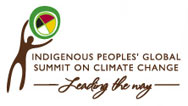
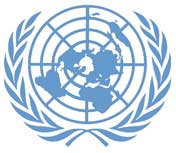
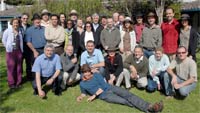
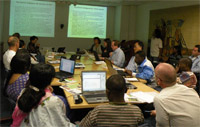
|
Recent Events
The CEESP Chair (Mead) and Deputy Chair (Pimbert) attended the Alaska Global Summit on Climate Change hosted by the Inuit Circumpolar Council April 20-24, 2009 in Anchorage.
The purpose of the summit was to enable Indigenous peoples from all regions of the globe, and observers, to exchange their knowledge and experience in adapting to... Read more >>>

The Future of Sustainable Development, May 11-12, UN New York. IUCN President (Ashok Khosla) and CEESP Chair (Mead) were invited to participate in a meeting convened by the UN Division for Sustainable Development (DESA in conjunction with the 17th session of the Commission on Sustainable Development. The meeting entitled, The Future of Sustainable Development: A Conclave of Thought Leaders", had three objectives... Read more >>> 
TILCEPA Participation in WCPA/CEC SC Meeting - From 11-15 May 2009, the World Commission on Protected Areas (WCPA) met for a Steering Committee meeting in Otavalo, Ecuador. Nigel Crawhall, co-Chair of TILCEPA attended to present the current work plan of TILCEPA and to participate in the Quadrennial planning effort... Read more >>>

Indigenous Peoples' & Community Conserved Areas and Territories (ICCAs) Technical Workshop and Side event at UNPFII - Members of TILCEPA and TSL organised a workshop on Indigenous Peoples' & Community Conserved Areas and Territorie (ICCAs) during the recent session of the UN Permanent Forum on Indigenous Issues... Read more >>>
 Back to top Back to top
|
|
|
Upcoming Events
CEESP Steering Committee Meeting, November 27 & 28, Bangkok, Thailand. The next meeting of the CEESP SC Meeting will be held at the IUCN Asia Regional Office in Bangkok. The SC would value the opportunity to meet with CEESP members in the region. Depending on funds, a members event might be scheduled. For further information on the SC Meeting, contact: Elizabeth Erasito and Michel Pimbert.

The Bonn Climate Change Talks - Workshop on "REDD Traps and how to avoid them", 3 June - The next round of climate negotiations to prepare for the 15th Conference of the Parties of the Climate Convention in December will take place in the Maritim Hotel in Bonn. Negotiations on REDD and other issues are moving forward now that the chair of the relevant working group (AWG LCA) has proposed a negotiating text to be used as the basis for the... Read more>>>

January 2011, Sharing Power: A New Development Paradigm - Whakatane, New Zealand. CEESP will be holding a Conference in New Zealand profiling the work of all of the Themes. Other IUCN Commissions ave also been invited to attend. Hosted by CEESP, Te Whare Wananga o Awanuiarangi (Maori Tribal University) and Victoria University of Wellington. Further details will be provided in future editions of the newsletter. 
IPCCA's Side-Event at the UN Expert Mechanism on the rights of Indigenous Peoples, August - UN, Geneva. Following on from the interest in the two IPCCA workshops held during the UN Permanent Forum on Indigenous Issues, an additional workshop has been scheduled. For further information contact: Grazia Borrini-Feyerabend (gbf@cenesta.org).
 Back to top Back to top
|
 |
PUBLICATIONS
Bishop, J., Kapila, S., Hicks, F., Mitchell, P., and Vorhies, F. (2009) “New business models for biodiversity conservation” Journal of Sustainable Forestry , 28 :285-303.

Ellingson, L. and Seidl, A. (2009) “Tourists' and Residents' Values for Maintaining Working Landscapes of the ‘Old West'” Journal of Rural Research & Policy 4 (1): 1-17 (January)

Govan, H. et al. 2009. Status and potential of locally-managed marine areas in the South Pacific: meeting nature conservation and sustainable livelihood targets through wide-spread implementation of LMMAs . SPREP/WWF/WorldFish-Reefbase/CRISP. 95pp + 5 annexes.

Govan, H., P. Cohen, C. Vieux, A. Tewfik, M.K. Tan, S.L. Tan, M.J. Radius, L.H. Teh and S.Abdullah, 2009. Map: Marine Managed Areas in the Pacific. SPREP, WWF and WorldFish Center.

Govan, H., Alifereti Tawake, Kesaia Tabunakawai, Aaron Jenkins, Antoine Lasgorceix, Erika Techera, Hugo Tafea , Jeff Kinch, Jess Feehely, Pulea Ifopo, Roy Hills, Semese Alefaio, Semisi Meo, Shauna Troniak, Siola'a Malimali, Sylvia George, Talavou Tauaefa, Tevi Obed. 2009. Community Conserved Areas: A review of status & needs in Melanesia and Polynesia . ICCA regional review for CENESTA /TILCEPA /TGER/IUCN/ GEF-SGP.

Huberman, D. (2008) “A Gateway to PES: Using Payments for Ecosystem Services for Livelihoods and Landscapes,” Markets and Incentives for Livelihoods and Landscapes Series No. 1, Forest Conservation Programme, IUCN, Gland.

REDD BRIEFING FOR COMMUNITIES - In response to a request by many Indigenous and non-Indigenous colleagues for comprehensible information on the negotiations on forests and climate change, especially for local communities and people who have not been closely involved in the Climate Change... Read more>>>

Philippines Mining or Food? Clive Wicks and Robert Goodland, Wicks and Goodland visited mining projects in the Philippines and, with help from many Filipinos, Co-Authored a 277 page publication Philippines Mining or Food? It is currently available on www.piplinks.org/miningorfood and... Read more>>>

Indigenous Peoples of Africa Tackle Climate Change The Indigenous Peoples of Africa Co-Ordinating Committee (IPCC) has uploaded onto YouTube videos a series of interviews with indigenous leaders from rainforest countries about their perspectives on REDD and the Forest Carbon Partnership Facility. As well there are videos from a subregional southern African workshop on plant knowledge and sustainable harvesting.

"Towards food sovereignty. Reclaiming autonomous food systems", Michel Pimbert, IIED, May 2009. The multimedia publication is the latest in a series, which explores equity and sustainability in the food and agriculture sector through text, photos, animations and video and audio clips.
Farmers and.... Read more>>>

|
|
|
|
|










 Elizabeth Erasito is from Rotuma, an island in the far north of Fiji. Rotuma has been politically a part of Fiji since 1881 and are a minority group in Fiji. Their culture closely resembles that of Polynesians. She is currently the Director for the National Trust of Fiji whose core function is cultural and natural heritage protection and the projects managed under her include community...
Elizabeth Erasito is from Rotuma, an island in the far north of Fiji. Rotuma has been politically a part of Fiji since 1881 and are a minority group in Fiji. Their culture closely resembles that of Polynesians. She is currently the Director for the National Trust of Fiji whose core function is cultural and natural heritage protection and the projects managed under her include community... Elise Huffer, (France and USA). Elise Huffer is the Culture Adviser in the Human Development Programme of the Secretariat of the Pacific Community based in Noumea, New Caledonia. In this position she is responsible for the promotion of culture in the Pacific Islands region. This entails implementation of model laws for the protection of traditional knowledge, the promotion of measures to assist the development of the arts and crafts sector (including the protection and promotion of natural resources the arts and crafts sectors depend on) and the promotion of cultural epistemology. The SPC covers 22 Pacific Islands Countries and Territories and works closely with member countries, the civil society sector and other governmental and non-governmental regional and...
Elise Huffer, (France and USA). Elise Huffer is the Culture Adviser in the Human Development Programme of the Secretariat of the Pacific Community based in Noumea, New Caledonia. In this position she is responsible for the promotion of culture in the Pacific Islands region. This entails implementation of model laws for the protection of traditional knowledge, the promotion of measures to assist the development of the arts and crafts sector (including the protection and promotion of natural resources the arts and crafts sectors depend on) and the promotion of cultural epistemology. The SPC covers 22 Pacific Islands Countries and Territories and works closely with member countries, the civil society sector and other governmental and non-governmental regional and...  Kenneth Iain MacDonald, (Canada). Kenneth MacDonald teaches in the Department of Geography; the Program in International Development Studies; and the Program in Diaspora and Transnational Studies at the University of Toronto, in Toronto, Ontario, Canada. He has conducted field research, primarily in northern Pakistan and India, since 1986 in areas as diverse as glacial hydrology, agro-ecology, cultural analyses of risk, the politics of labour relations in the mountaineering industry, the cultural politics of conservation, and the production of cultural identity. These projects are held together by a desire to understand how communities and environments function in a world in which the lives of individuals are tied together through spatially extensive relations...
Kenneth Iain MacDonald, (Canada). Kenneth MacDonald teaches in the Department of Geography; the Program in International Development Studies; and the Program in Diaspora and Transnational Studies at the University of Toronto, in Toronto, Ontario, Canada. He has conducted field research, primarily in northern Pakistan and India, since 1986 in areas as diverse as glacial hydrology, agro-ecology, cultural analyses of risk, the politics of labour relations in the mountaineering industry, the cultural politics of conservation, and the production of cultural identity. These projects are held together by a desire to understand how communities and environments function in a world in which the lives of individuals are tied together through spatially extensive relations... 
 Peter Herman May, (Brazil and USA). Peter May is President of the International Society for Ecological Economics. He received his PhD in Resource Economics from Cornell University in 1986. Professor of the Department of Development, Agriculture and Society of the Federal Rural University of Rio de Janeiro, Brazil since 1991, he is now also an Associate Director of Friends of the Earth-Brazilian Amazon. Author and editor of 12 books in the areas of ecological economics, agro ecology and environmental policy, including The Subsidy from Nature , Pricing the Planet and Natural Resource Valuation and Policy in Brazil (all published by Columbia UP), He previously served as program officer at the Ford Foundation's Brazil office and as Forestry Officer...
Peter Herman May, (Brazil and USA). Peter May is President of the International Society for Ecological Economics. He received his PhD in Resource Economics from Cornell University in 1986. Professor of the Department of Development, Agriculture and Society of the Federal Rural University of Rio de Janeiro, Brazil since 1991, he is now also an Associate Director of Friends of the Earth-Brazilian Amazon. Author and editor of 12 books in the areas of ecological economics, agro ecology and environmental policy, including The Subsidy from Nature , Pricing the Planet and Natural Resource Valuation and Policy in Brazil (all published by Columbia UP), He previously served as program officer at the Ford Foundation's Brazil office and as Forestry Officer...  Alejandro Nadal, (Mexico). Alejandro Nadal is a professor at El Colegio de México, where he directs the research Program on Science, Technology and Development (1982-2007). He has a B.A. in Law from the National Autonomous University and a Ph.D. in Economics from the University of Paris X (Nanterre). He has carried out research on macroeconomics, general equilibrium theory, technical change, nuclear weapons and sustainable resource management. He was responsible for the course on Comparative Economic Theory in the MA and PhD programs at the Center for Economic Studies, El Colegio de México (1982-2006). He was chair of the Collaborative Research Competition of the John D. and Caherine T. MacArthur Foundation (1991-1992), where he was also Distinguished...
Alejandro Nadal, (Mexico). Alejandro Nadal is a professor at El Colegio de México, where he directs the research Program on Science, Technology and Development (1982-2007). He has a B.A. in Law from the National Autonomous University and a Ph.D. in Economics from the University of Paris X (Nanterre). He has carried out research on macroeconomics, general equilibrium theory, technical change, nuclear weapons and sustainable resource management. He was responsible for the course on Comparative Economic Theory in the MA and PhD programs at the Center for Economic Studies, El Colegio de México (1982-2006). He was chair of the Collaborative Research Competition of the John D. and Caherine T. MacArthur Foundation (1991-1992), where he was also Distinguished...  Pavan Sukhdev,
Pavan Sukhdev,  Arzu Rana Deuba, (Nepal). Arzu Deuba is an M.P. in Nepal. She is Chair of the CEESP Theme on Environment & Security and is also a member of CEC. She graduated from St. Bedes College, Himalchal Pradesh University and Punjab University from where she not only got her Master's degree but also her Ph.D in organizational Psychology in 1990. The time after her graduation was a period of both realization and decision making for Deuba. It was in the late 1980s and the early 1990s that the importance of issues related to environment came to forefront in Nepal due to a number of developments that occurred during that period. The primary factor that gave momentum to the issue of...
Arzu Rana Deuba, (Nepal). Arzu Deuba is an M.P. in Nepal. She is Chair of the CEESP Theme on Environment & Security and is also a member of CEC. She graduated from St. Bedes College, Himalchal Pradesh University and Punjab University from where she not only got her Master's degree but also her Ph.D in organizational Psychology in 1990. The time after her graduation was a period of both realization and decision making for Deuba. It was in the late 1980s and the early 1990s that the importance of issues related to environment came to forefront in Nepal due to a number of developments that occurred during that period. The primary factor that gave momentum to the issue of...  Janis Bristol Alcorn, (USA). Janis Alcorn has over thirty years experience in conservation of biodiversity, international development, and research in tropical ecology and indigenous natural resource management systems, in Asia, Africa and the Americas. She received her Ph.D. in Botany, with a minor in Anthropology, from the University of Texas at Austin in 1982. She served on the faculty at Tulane University, as an American Association for the Advancement of Science (AAAS) Fellow in USAID, Fellow in the Governance program at World Resources Institute, and as Director for Asia & Pacific and the global Peoples, Forests and Reefs Program at the Biodiversity Support Program at WWF. She is currently an independent consultant...
Janis Bristol Alcorn, (USA). Janis Alcorn has over thirty years experience in conservation of biodiversity, international development, and research in tropical ecology and indigenous natural resource management systems, in Asia, Africa and the Americas. She received her Ph.D. in Botany, with a minor in Anthropology, from the University of Texas at Austin in 1982. She served on the faculty at Tulane University, as an American Association for the Advancement of Science (AAAS) Fellow in USAID, Fellow in the Governance program at World Resources Institute, and as Director for Asia & Pacific and the global Peoples, Forests and Reefs Program at the Biodiversity Support Program at WWF. She is currently an independent consultant...  Li Bo, (China). Li Bo is a member of the Bai ethnic group from North Western Yunnan (China) [the Bai are an indigenous minority of four million people]. President of Friends of Nature in Beijing – the largest Chinese domestic environment NGO. Li Bo holds a Master of Science Degree on Natural Resources Management from Cornell University and since 1994 has been working with non-governmental initiatives in South West China as farmers' rights activist, project officer, trainer, researcher and consultant on issues of livelihoods of mountain communities and biodiversity conservation. Throughout these twelve years, he developed an enduring passion...
Li Bo, (China). Li Bo is a member of the Bai ethnic group from North Western Yunnan (China) [the Bai are an indigenous minority of four million people]. President of Friends of Nature in Beijing – the largest Chinese domestic environment NGO. Li Bo holds a Master of Science Degree on Natural Resources Management from Cornell University and since 1994 has been working with non-governmental initiatives in South West China as farmers' rights activist, project officer, trainer, researcher and consultant on issues of livelihoods of mountain communities and biodiversity conservation. Throughout these twelve years, he developed an enduring passion...  Nigel Crawhall, (South Africa). Nigel Crawhall holds a PhD in Sociolinguistics from the University of Cape Town. He is currently the Director of Secretariat for the Indigenous Peoples of Africa Coordinating Committee (
Nigel Crawhall, (South Africa). Nigel Crawhall holds a PhD in Sociolinguistics from the University of Cape Town. He is currently the Director of Secretariat for the Indigenous Peoples of Africa Coordinating Committee ( Jannie Lasimbang, (Malaysia). Jannie Lasimbang is Kadazan, one of
Jannie Lasimbang, (Malaysia). Jannie Lasimbang is Kadazan, one of  Emmanuel Asuquo Obot, (Nigeria). Emmanuel Obot is the Executive Director of the Nigerian Conservation Foundation. He has a PhD (Botany) and his main areas of work and experience are as follows: Biodiversity Conservation, Biodiversity Related Research, Project management, Sustainable Development, Forest Resources Policy, Forest Resources Management, Training in Natural Resources Management, Natural Resources Policy Advocacy, Community Based Conservation Management, Wetland Resources Management. He has worked, for twenty-eight years, on the design and implementation ...
Emmanuel Asuquo Obot, (Nigeria). Emmanuel Obot is the Executive Director of the Nigerian Conservation Foundation. He has a PhD (Botany) and his main areas of work and experience are as follows: Biodiversity Conservation, Biodiversity Related Research, Project management, Sustainable Development, Forest Resources Policy, Forest Resources Management, Training in Natural Resources Management, Natural Resources Policy Advocacy, Community Based Conservation Management, Wetland Resources Management. He has worked, for twenty-eight years, on the design and implementation ...  María Pacheco, (Guatemala). Maria Pacheco is a biologist and an organic farmer. In 1993, María was approached by a group of villagers from a war-torn village who wanted her help in finding a way out of poverty. Ten farmers started the project, and with María's guidance and assistance, worked on reforestation and helped the land recover, eventually developing products such as wooden educational toys for sale, developing markets, and finding financial assistance. Then, in 2001, María was asked to help another group of villages in Jocotán near the border with Honduras, a community of Chortí Maya. (In prehispanic times, the Chortí Maya were the weavers of the rugs, the mats on which the kings sat ...
María Pacheco, (Guatemala). Maria Pacheco is a biologist and an organic farmer. In 1993, María was approached by a group of villagers from a war-torn village who wanted her help in finding a way out of poverty. Ten farmers started the project, and with María's guidance and assistance, worked on reforestation and helped the land recover, eventually developing products such as wooden educational toys for sale, developing markets, and finding financial assistance. Then, in 2001, María was asked to help another group of villages in Jocotán near the border with Honduras, a community of Chortí Maya. (In prehispanic times, the Chortí Maya were the weavers of the rugs, the mats on which the kings sat ...  Clive Montgomery Wicks, (United Kingdom). Conservation and Development Consultant, Specialising in the Impact of Extractive Industries on the Environment. He is a Fellow of the Chartered Institute of Management UK. He has 48 years of experience of working in engineering, agriculture and on environmental issues. He is Vice Chair of CEESP the IUCN Commission on Environmental, Economic and Social Policy and Co-Chair of SEAPRISE the...
Clive Montgomery Wicks, (United Kingdom). Conservation and Development Consultant, Specialising in the Impact of Extractive Industries on the Environment. He is a Fellow of the Chartered Institute of Management UK. He has 48 years of experience of working in engineering, agriculture and on environmental issues. He is Vice Chair of CEESP the IUCN Commission on Environmental, Economic and Social Policy and Co-Chair of SEAPRISE the...  Taghi Farvar, (Iran). Taghi Farvar is the former Chair of CEESP (2000-2008). He has over 35 years of international professional experience in Africa, Asia, Latin America/Caribbean as well as Europe and North America as field worker, researcher, trainer, advisor, planner, manager, organiser and policy-maker for programmes and projects in integrated, sustainable and participatory management of natural resources; promotion of sustainable livelihoods and poverty alleviation; conflict resolution on natural resources...
Taghi Farvar, (Iran). Taghi Farvar is the former Chair of CEESP (2000-2008). He has over 35 years of international professional experience in Africa, Asia, Latin America/Caribbean as well as Europe and North America as field worker, researcher, trainer, advisor, planner, manager, organiser and policy-maker for programmes and projects in integrated, sustainable and participatory management of natural resources; promotion of sustainable livelihoods and poverty alleviation; conflict resolution on natural resources...  Lucy Mulenkei, (Kenya). Lucy Mulenkei is a Maasai from Kenya who has began as a broadcast journalist in the government-run radio for 17 years on issues of the environment and development. Her programming focused on environment problems in rural Kenya and the East African Region. Lucy also runs the Indigenous Information Network (IIN) in Kenya, which publishes the popular grassroots publication, Nomadic News, focusing on environmental issues and successes affecting pastoralists and hunter-gatherers in Africa. IIN also disseminates environmental information related to the indigenous movement worldwide, and organizes...
Lucy Mulenkei, (Kenya). Lucy Mulenkei is a Maasai from Kenya who has began as a broadcast journalist in the government-run radio for 17 years on issues of the environment and development. Her programming focused on environment problems in rural Kenya and the East African Region. Lucy also runs the Indigenous Information Network (IIN) in Kenya, which publishes the popular grassroots publication, Nomadic News, focusing on environmental issues and successes affecting pastoralists and hunter-gatherers in Africa. IIN also disseminates environmental information related to the indigenous movement worldwide, and organizes...  Michel Pimbert,
Michel Pimbert,  Financial Officer: Richard Cellarius, (USA). Dr. Cellarius has a great deal of experience in environmental sciences, education, and policy. A major focus of his professional and volunteer efforts has been the application of environmental knowledge and understanding to environmental decision making. He has an undergraduate degree in Physics and a Ph.D. in Biological Sciences. He has 43 years of college and university teaching experience, and research experience in the natural sciences and environmental studies, including teaching and supervision of graduate students in ecology, ecological physiology, alternative ...
Financial Officer: Richard Cellarius, (USA). Dr. Cellarius has a great deal of experience in environmental sciences, education, and policy. A major focus of his professional and volunteer efforts has been the application of environmental knowledge and understanding to environmental decision making. He has an undergraduate degree in Physics and a Ph.D. in Biological Sciences. He has 43 years of college and university teaching experience, and research experience in the natural sciences and environmental studies, including teaching and supervision of graduate students in ecology, ecological physiology, alternative ...  Advisor, Cross Commission Collaboration: Donna Craig (Australia). Donna Craig is an academic and specialist practitioner in the area of international and national environmental law and policy. She obtained a Masters degree in Environmental Law from Osgoode Hall Law School , York University, Canada in 1983. Donna has over 30 years experience in research, legal practice, teaching and working with communities, indigenous peoples' organisations, governments and corporations. Her many publications emphasize the social, cultural and human rights dimensions of environmental and social impact assessment and sustainable development. In private practice, Donna has developed corporate environmental management strategies, compliance training and environmental...
Advisor, Cross Commission Collaboration: Donna Craig (Australia). Donna Craig is an academic and specialist practitioner in the area of international and national environmental law and policy. She obtained a Masters degree in Environmental Law from Osgoode Hall Law School , York University, Canada in 1983. Donna has over 30 years experience in research, legal practice, teaching and working with communities, indigenous peoples' organisations, governments and corporations. Her many publications emphasize the social, cultural and human rights dimensions of environmental and social impact assessment and sustainable development. In private practice, Donna has developed corporate environmental management strategies, compliance training and environmental...  Advisor, Grazia Borrini-Feyerabend (Switzerland). Grazia Borrini-Feyerabend has been active in solar physics, public health, aid policy and community initiatives for conservation and sustainable development. After a research career in physics as European Space Agency Fellow (University of Florence, Italy; Stanford University, California) she pursued studies and became engaged as researcher and teacher in public health and development subjects (University of California at Berkeley, California; National Institute of Health, Italy). In the mid 1990s she pioneered the Primary Environmental Care approach, which later became...
Advisor, Grazia Borrini-Feyerabend (Switzerland). Grazia Borrini-Feyerabend has been active in solar physics, public health, aid policy and community initiatives for conservation and sustainable development. After a research career in physics as European Space Agency Fellow (University of Florence, Italy; Stanford University, California) she pursued studies and became engaged as researcher and teacher in public health and development subjects (University of California at Berkeley, California; National Institute of Health, Italy). In the mid 1990s she pioneered the Primary Environmental Care approach, which later became... 







